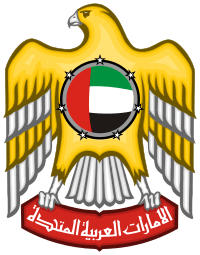Syria–United Arab Emirates relations
Syria – United Arab Emirates relations are the relations between the United Arab Emirates and Syria. The UAE has an embassy in Damascus while Syria maintains an embassy in Abu Dhabi and a consulate-general in Dubai. Both countries are part of the Middle East region and share close cultural ties.
 | |
Syria |
United Arab Emirates |
|---|---|
Diplomatic relations
In 2011, the Syrian Civil War began. On 25 September 2013, Foreign minister Abdullah bin Zayed Al Nahyan said that UAE would continue to support the Syrian people and their legitimate aspirations for restoring security and stability to the country.[1] The UAE is not actively supporting the government of Bashar Al-Assad. On 13 January 2014, Vice President, Prime Minister and Emir of Dubai Shaikh Mohammed bin Rashid Al Maktoum said that there could be no long-term solution to ending the war with Assad in power, and predicted that the Syrian president would eventually lose power.[2]
The UAE stance on the Syrian conflict has been described as "less aggressive" than Saudi Arabia or Qatar - but, unlike Egypt, not "favourable to Assad".[3] However, it has exhibited openness to Assad remaining in power as part of a peace settlement.[4] It has been critical of Saudi, Qatari and Turkish support for Islamist rebel groups in Syria.[5]
The UAE took part in the 2014 American-led intervention in Syria against ISIL.[6] It later broke with Saudi Arabia by supporting the 2015 Russian military intervention in the Syrian Civil War, maintaining it was against a "common enemy".[7] It also reportedly provided funding for the moderate Southern Front, through an Amman-based Military Operations Center, although this Center has been inactive since 2017.[8][9] Alongside the United States, it has been involved in supporting and training the Kurdish-dominated Syrian Democratic Forces (SDF) from 2017 onwards.[3][10][11] Along with Egypt and Russia, it also supports the Syria's Tomorrow Movement, which has a military wing, the Elite Forces, that is part of the SDF.[12]
The UAE initially floated normalising relations with Syria in 2016 in order to reduce Syrian dependence on Iran, but the suggestion was rejected by the United States.[13]
In April 2018, Emirati Foreign Minister Anwar Gargash stated, "Our position on the Syrian crisis is very clear: a few years ago we had a choice — to support Bashar Assad or the opposition, which was joined by jihadists and even many terrorist elements, and we chose to be somewhere between. We confirm the need for a political solution in Syria. It is impossible to achieve stability in this country through a military solution."[14]
In June 2018, Gargash criticised the decision to suspend Syrian membership of the Arab League, noting, "it meant we had no political leverage at all, no open channel, we could not present an Arab prism to how the Syrian issue should be resolved."[15]
In November 2018, it was reported that the United Arab Emirates was negotiating with Syria over the reopening of its embassy in Damascus, already had a diplomat permanently stationed there, and was acting as an intermediary between Syria and Saudi Arabia in reconciliation talks involving those two countries.[16] On 27 December 2018, the United Arab Emirates announced it had reopened its embassy in Damascus, after over 6 years of closure.[17][18] The UAE issued a statement that said the country was "keen to put relations back on their normal track", while Gargash tweeted that "An Arab role in Syria has become even more necessary to face the regional expansionism of Iran and Turkey."[19]
In early January 2019, following the embassy opening, Emirates, FlyDubai and Etihad announced plans to fly to Syria again, but no announcement has been made regarding when flights will restart. In an attempt to restore ties with the Syrian government, the UAE hosted a Syrian trade delegation in January 2019. The meeting was led by a businessman and lawmaker who has been on US Treasury sanctions list since 2011.[20][21]
On 29 January 2019, the UAE Minister of State of Foreign Affairs said regarding the Israeli strikes on Syria that the UAE supported Syria and a united capable Arab Syria. However, he also said that the UAE was against the Iranians' presence in Syria and that the dispute is caused by the freedom of movement Iran has in Syria.[22]
In December 2019, the UAE's charges d'affairs in Damascus, Abdul Hakim Ibrahim al-Nuaimi, praised the "wise leadership of President Bashar al-Assad" and described relations between the countries as "solid, distinct and strong". Syrian deputy foreign minister Faisal Mekdad responded by stating, "We cannot forget that the United Arab Emirates stood by Syria in its war against terrorism".[23]
On 27 March 2020, Abu Dhabi crown prince Mohammed bin Zayed Al Nahyan and Syrian President Bashar al-Assad discussed the COVID-19 pandemic on phone.[24]
References
- "UAE reaffirms support for Syria". Gulf News. 25 September 2013. Retrieved 25 September 2013.
- "No peace as long as Al Assad stays, Mohammad says". gulfnews.com.
- "The UAE has it in for the Muslim Brotherhood". Al-Araby Al-Jadeed. 22 February 2017.
- "How Russia Is Courting the Gulf". Kataeb. 3 August 2016.
- ""Un-Brotherly" Saudi-Emirati Ties". Middle East Forum. 1 March 2018.
- Sciutto, Jim; Castillo, Mariano; Yan, Holly (22 September 2014). "US airstrikes hit ISIS inside Syria for first time". CNN. Retrieved 22 September 2014.
- "UAE Says Ready To Commit Troops To Fight Syria Jihadists". Defense News. 30 November 2015. Retrieved 23 December 2015.
- "The Southern Front". Stanford University. Retrieved 12 August 2017.
- "Jordan, Israel hedge their bets in southwest Syria". Al-Monitor. 22 March 2018.
- "UAE, Kurds Standing against US, Turkey in Syria". Farsnews. 22 February 2017.
- "The U.S. bombing of Syria implicates many of Trump's business interests". Vox. 16 April 2018.
- "UAE, Egypt back launch of new Syrian opposition movement". Al-Araby Al-Jadeed. 12 March 2016.
- "Syria: Assad has decisively won his brutal battle". The Guardian. 30 December 2018.
- "Syrian Crisis Can Not Be Resolved Via Military Solutions - UAE Foreign Minister". Sputnik News. 10 April 2018.
- "Dr Anwar Gargash: solving the Qatar crisis must involve tackling the 'trust deficit'". The National. 7 June 2018.
- Arab, The New. "UAE 'to reopen Syria embassy' as Gulf states warm up to Assad". alaraby.
- "BREAKING: UAE Embassy in Damascus resumes diplomatic service". wam.
- "UAE reopens Syria embassy, a boost for Assad". Reuters. 27 December 2018.
- "UAE reopens Damascus embassy after seven years". Arabian Business. 27 December 2018.
- "Syrian Businessman on US Sanctions List Hosted by UAE". Voice of America. Retrieved 22 January 2019.
- "Syrian businessman on US sanctions list hosted by UAE". Associated Press. Retrieved 22 January 2019.
- "Anwar Gargash: Iran's presence in Syria must be reduced". Memri TV. Retrieved 24 February 2019.
- "UAE praises Syria's Assad for 'wise leadership', cementing ties". Reuters. 3 December 2019.
- "Abu Dhabi crown prince, Syrian president discuss coronavirus". Reuters. 27 March 2020.

